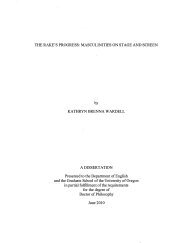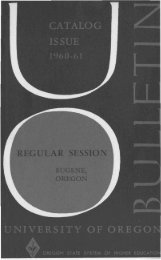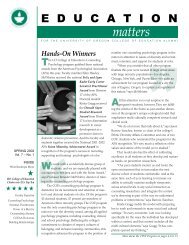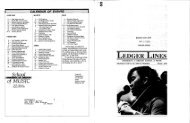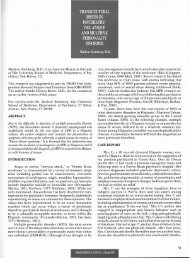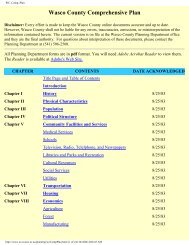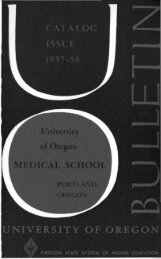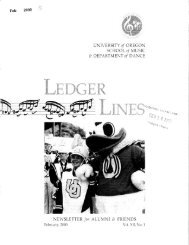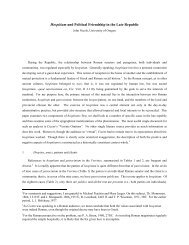~EGULAR SESSION - University of Oregon
~EGULAR SESSION - University of Oregon
~EGULAR SESSION - University of Oregon
Create successful ePaper yourself
Turn your PDF publications into a flip-book with our unique Google optimized e-Paper software.
CURRICULUM AND REQUIREMENTS 121<br />
(d) Science-Physical Science (Honors College) (GS 204, 205, 206); or<br />
Biological Science (Honors College) (Bi 104, 105, 106) ; or General<br />
Chemistry (Ch 204, 205, 206) ; or General Physics, honors section (Ph<br />
201,202, 203).<br />
(e) Philosophy-Introduction to Philosophy (Honors College) (Phi 207,<br />
208, 209).<br />
(f) Mathematics-Fundamentals <strong>of</strong> Mathematics (Honors College) (Mth<br />
107, 108, 109) ; or Analytic Geometry and Calculus, honors section (Mth<br />
204,205,206).<br />
Students may prepare for the comprehensive examinations in the core areas by<br />
taking the designated courses or through independent study. A student who prepares<br />
without formal course work, and passes the comprehensive examination,<br />
may receive credit in the corresponding course. A student who receives full<br />
college credit, through the Advanced Placement Program, for a course included<br />
in the Honors College core program satisfies the requirement in that field and<br />
is excused from the comprehensive examination. With the consent <strong>of</strong> his adviser,<br />
a liberal arts major may omit one <strong>of</strong> the six core areas and a pr<strong>of</strong>essional-school<br />
major may omit two.<br />
(3) Honors work in English composition-one term <strong>of</strong> Expository Writing<br />
(Wr 226), two terms <strong>of</strong> Composition Tutorial (Wr 231, 232).<br />
(4) Two terms in Colloquium (HC 404) in the junior or senior year. Colloquia<br />
provide seminar-type instruction for students <strong>of</strong> varying backgrounds, focusing<br />
for one term on a common topic outside the students' major fields.<br />
(5) Completion <strong>of</strong> an honors program in the student's major; see MAJOR<br />
REQUIREMENTS, below.<br />
(6) Satisfactory performance in a final comprehensive oral examination<br />
covering the student's major and related work.<br />
Honors College students must also satisfy general <strong>University</strong> requirements<br />
for the B.A. degree (other than the group requirement).<br />
An Honors College student majoring in a pr<strong>of</strong>essional field may qualify for<br />
both the B.A. (Honors College) and a pr<strong>of</strong>essional bachelor's degree.<br />
In addition to the courses listed above, the Honors College curriculum<br />
includes honors work in English composition, honors sections in several other<br />
fields (including basic design, foreign languages, literature, United States history,<br />
speech, accounting, statistics, and health education), and opportunities for work in<br />
departmental honors seminars, research projects, and reading and conference.<br />
The Honors College student takes approximately two-thirds <strong>of</strong> his work in<br />
honors classes and the remainder in regular <strong>University</strong> courses.<br />
Major Requirements<br />
The major programs planned by departments and schools for students in<br />
the Honors College provide for independent study and generally allow greater<br />
flexibility in the satisfaction <strong>of</strong> course requirements than the regular undergraduate<br />
programs <strong>of</strong> the divisions. The special requirements <strong>of</strong> the several divisions<br />
for majors enrolled in the Honors College are listed below.<br />
General Arts and Letters. At least 9 term hours in seminar, reading and<br />
conference, thesis, or research (or a combination), leading to the preparation <strong>of</strong><br />
senior honors thesis.<br />
General Social Science. (1) Of the four upper-division year sequences<br />
required <strong>of</strong> all majors, at least one at the 400 level; (2) at least 9 term hours in<br />
seminar, reading and conference, thesis, or research (or a combination), leading<br />
to the preparation <strong>of</strong> senior honors thesis.




